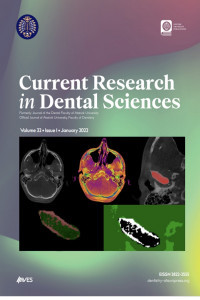TERBİNAFİNE KULLANIMINA BAĞLI TAT DUYUSU BOZUKLUĞU: BİR OLGU SUNUMU
Terbinafine, antimikotik, tat duyusu bozukluğu
TERBİNAFİNE INDUCED TASTE LOSS : A CASE REPORT
Terbinafine, antimycotic, taste disorders,
___
- Doty RL, Bromley SM. Effects of drugs on olfaction and 2004;37:1229–54 Clin North Am
- Balfour JA, Faulds D. Terbinafine: a review of its pharmacodynamic and pharmacokinetic properties and therapeutic potential in superficial mycoses. Drugs 1992 43: 259–4.
- O’Sullivan DP, Needham CA, Bangs Aet al. Postmarketing surveillance of oral terbinafine in U.K. Br J Clin Pharmacol 1996; 42: 559–65.
- Abdel-Rahman SM, Nahata MC. Oral terbinafine: a new anti-fungal agent. Ann Pharmacother 1997; 31: 445–56.
- Markley EJ, Mattes-Kulig DA, Henkin RI: A classification of dysgeusia.J Am Diet Assoc 1983;83:578-80
- Miller SM, Naylor GJ: Unpleasant taste-a neglected symptom in depression. J Affect Disord 1989;17:291-93
- Beutler M, Hartmann K, Kuhn M, Gartmann J. Taste disorders and terbinafine. BMJ 1993; 307: 26.
- Stricker BH, Van RM, Sturkenboom MC, Ottervanger JP. Taste loss to terbinafine: a case- control study of potential risk factors.Br J Clin Pharmacol 1996;42:313-8
- Bong JL, Lucke TW, Evans CD. Persistent impairment of taste resulting from terbinafine. Br J Dermatol 1998;139: 747–8
- Henkin RI. Drug induced taste and smell disturbance. Drug Safety 1994; 11: 318–77.
- Hellekant G, Danilova V, Ninomiya Y. Primate sense of taste: behavioral and single chorda tympani and glossopharyngeal nerve fiber recordings in the rhesus monkey, Macaca mulatta. J Neurophysiol 1997;77:978–93.
- Schiffman SS. Taste and smell in disease. NEngIlMed 1983;308:1275-9.
- Jaffe IA. Adverse effects profile of sulfhydryl compounds in man. Am J Med 1986;80:47 1-6.
- Abu-Hamdan DK, Desai H, Sondheimer J, Felicetta J, Mahajan S, McDonald F. Taste acuity and zinc metabolism in captopriltreated hypertensive male patients. Am J Hypertens 1988;l:303-8S
- Juhlin L. Loss of taste and terbinafine. Lancet 1992;339:1483.
- Avcu N, Uysal S, Akçiçek G. Diabetes mellituslu bir olguda çinko eksikliğine bağlı tat duyusu bozukluğu. İstanbul Ü Diş Hek Fak Derg 2011; 45: 83-7.
- Başlangıç: 1986
- Yayıncı: Atatürk Üniversitesi
Binali ÇAKUR, Ahmet YILMAZ, Doğan DURNA, Kader AZLAĞ
TOTAL PROTEZ OLGULARINDA SİSTEMİK HASTALIKLARIN ÖNEMİ
DENTAL KÖK HÜCRELER VE SÜT DİŞLERİNİN KÖK HÜCRE ÇALIŞMALARINDAKİ ÖNEMİ
Gülcan ÜNSAL, Özge ÖZMEKİK, İşın ULUKAPI
RESTORATİF MATERYALLERİN DENTAL BİYOFİLM ÜZERİNE ETKİLERİ
Elif YAMAN DOSDOĞRU, Arzu PINAR ERDEM, Elif SEPET, Zeynep AYTEPE
AKTİNOMİKOZ OSTEOMYELİTİNE BAĞLI PATOLOJİK MANDİBULA FRAKTÜRÜ: OLGU SUNUMU
Burak CEZAİRLİ, Kadriye YILDIZ, Celal ÇANDIRLI, Cem ÜNGÖR
İMPLANT DİŞ HEKİMLİĞİNDE KULLANILAN RADYOGRAFİK TEKNİKLERİN CERRAHİ VE PROTETİK TEDAVİDEKİ YARARLARI
Gamze ALNIAÇIK, Özgür İNAN, Önjen TAK
Emre TOKAR, Özgül KARACAER, Nihal PEHLİVAN
FİBRÖZ DİSPLAZİ: BİR OLGU SUNUMU
Binali ÇAKUR, Doğan DURNA, Osman BİLGE, Eren YILDIRIM
LATERAL PERİODONTAL KİST: VAKA RAPORU
Saadettin DAĞISTAN, İ. Şevki BAYRAKDAR
